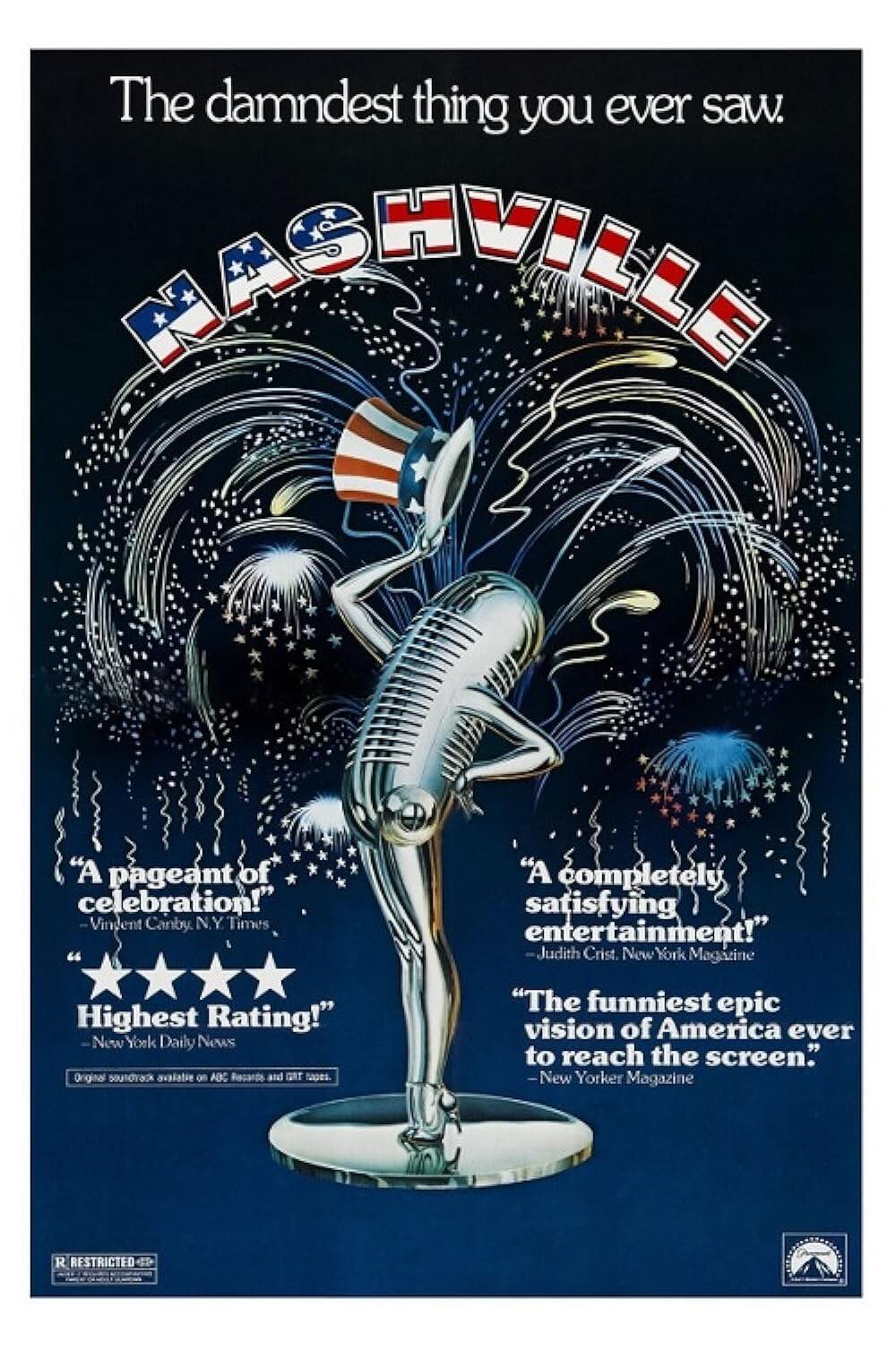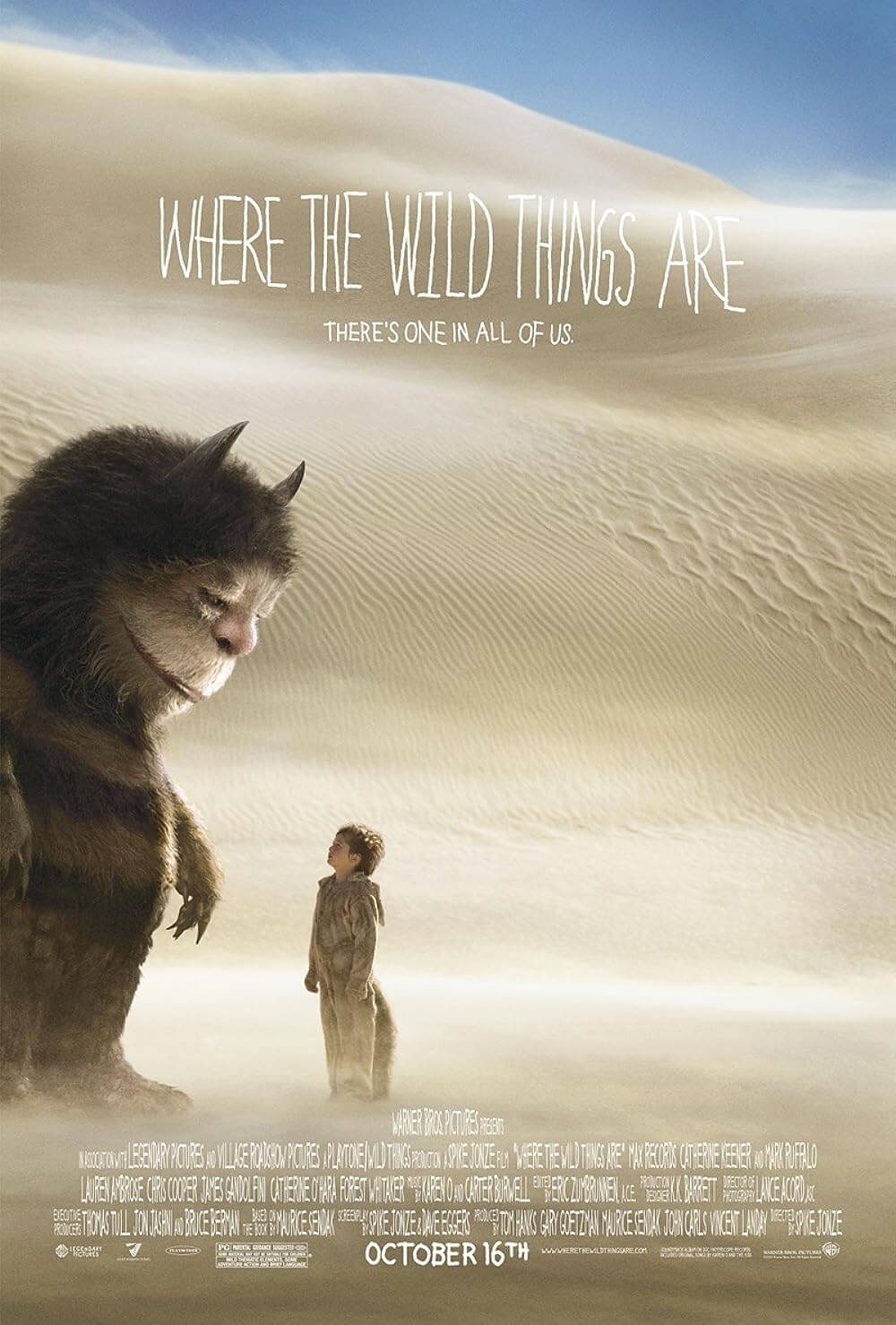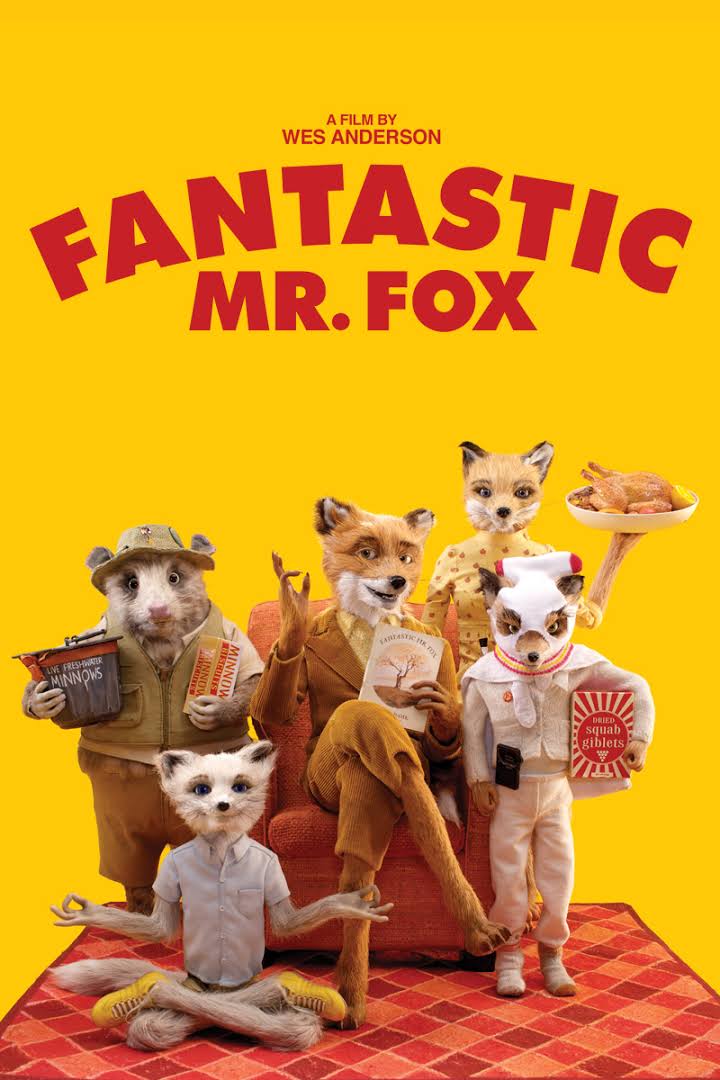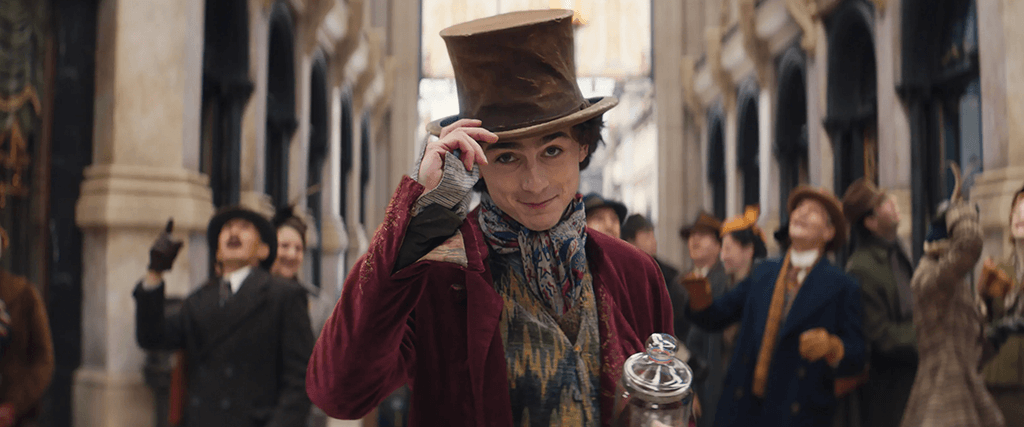
Wonka
By Brian Eggert |
With the first notes from “Pure Imagination” on Wonka’s score, Paul King’s production tips its top hat to the 1971 original starring Gene Wilder. For many fans, Willy Wonka & the Chocolate Factory is a rare film from childhood that holds up as an adult. Its initial sweetness matures into an uncertain macabre quality, perfected by Wilder’s inscrutable performance. That first adaptation of Roald Dahl’s book came out when Hollywood was floundering. The studios were losing the war with television, and blockbusters such as The Godfather (1972), Jaws (1975), and Star Wars (1977) had not yet arrived. It was the time of the lavish movie musical. Willy Wonka & the Chocolate Factory followed titles from Paint Your Wagon to Hello, Dolly!, both released in 1969—the same year Carol Reed’s Oliver!, the 1968 musical of Charles Dickens’ Oliver Twist, won six Oscars, including Best Picture. Wonka plays in the style and tone of that era and, similarly to Reed’s film, takes established material and gives it the movie musical treatment. Even the title has been reduced to a given name. The only thing missing is the exclamation point.
If there’s any modern musical that should have such punctuation, it’s Wonka, a production so candy-coated and whimsical it’s bound to give you a tummy ache. Directed by King, who warmed the hearts of millions with Paddington (2014) and Paddington 2 (2017), the new version looks and feels part of the same universe. Production designer Nathan Crowley gives even the most outlandish buildings and interiors a tangible quality, filling the screen with lavish details and colorful sets that transported me to its storybook world. Costume designer Lindy Hemming crafts garb as expressive as the wonderful musical numbers, which include excellent songs by Neil Hannon and music by Joby Talbot. South Korean cinematographer Chung-hoon Chung creates the kind of lighting that could only exist in a musical; it’s bright and alive, even in scenes dominated by computer-generated backdrops. These elements might justify a trip to the theater, but it gets even better—the screenplay by King and Simon Farnaby also features plenty of barbed humor and warm fuzzies.
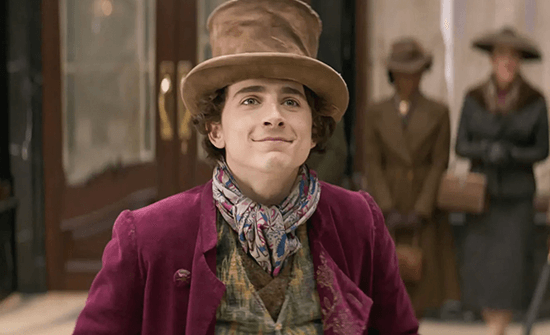 And yet, much of the production’s goodwill might be wasted on a grossly unsuitable Timothée Chalamet as the up-and-coming Wonka, whose modern sensibilities leave no mystery behind his eyes, no danger. He’s a far cry from Wilder but has much less creep factor than Johnny Depp in Tim Burton’s Charlie and the Chocolate Factory (2005). It’s difficult to imagine Chalamet growing up to become the roguish, somewhat wicked version played by Wilder. Chalamet is all about overdoing it—his smiles, his line delivery. From the moment he arrives by ship out of a Monet fog, after a seven-year journey abroad where he learned to become a “magician, inventor, and chocolate maker”—but alas, never learned to read—he wears every emotion on his face. Although given by an actor I usually enjoy, the performance is like watching a really good high-school drama club member do a bad interpretation of Wonka. I never believed him. And given that he’s the main character and onscreen for most scenes, he almost single-handedly derails the experience.
And yet, much of the production’s goodwill might be wasted on a grossly unsuitable Timothée Chalamet as the up-and-coming Wonka, whose modern sensibilities leave no mystery behind his eyes, no danger. He’s a far cry from Wilder but has much less creep factor than Johnny Depp in Tim Burton’s Charlie and the Chocolate Factory (2005). It’s difficult to imagine Chalamet growing up to become the roguish, somewhat wicked version played by Wilder. Chalamet is all about overdoing it—his smiles, his line delivery. From the moment he arrives by ship out of a Monet fog, after a seven-year journey abroad where he learned to become a “magician, inventor, and chocolate maker”—but alas, never learned to read—he wears every emotion on his face. Although given by an actor I usually enjoy, the performance is like watching a really good high-school drama club member do a bad interpretation of Wonka. I never believed him. And given that he’s the main character and onscreen for most scenes, he almost single-handedly derails the experience.
The story, credited to King, follows Wonka as he arrives penniless at the Galleries Gourmet—a confectionary hub in a nondescript European city—to make his fortune. But he quickly finds himself conscripted into laundry duties by two unscrupulous renters, Mrs. Scrubbit and Bleacher (Olivia Colman, Tom Davis). Toiling alongside him are other hard-luck cases, each with on-the-nose names, duped into service by the pair: Noodle (Calah Lane), a young orphan girl; Mr. Crunch (Jim Carter), a former accountant; Piper (Natasha Rothwell), a plumber; Larry Chucklesworth (Rich Fulcher), a failed comedian; Lottie Bell (Rakhee Thakrar), an untalkative communications expert. With their help, Wonka attempts to free himself from servitude and start his legacy as a chocolatier. However, three established businessmen in the field, known collectively as the Chocolate Cartel—the sinister Slugworth (Paterson Joseph), the elitist Fickelgruber (Mathew Baynton), and the dopily guileless Prodnose (Matt Lucas)—go to great lengths to stop Wonka. They even hire the local Police Chief (Keegan-Michael Key) to eliminate the competition, making their payoffs in chocolate.
The supporting cast and songs are uniformly marvelous. Colman’s yellow-teethed Dickensian villain and her buffoonish counterpart Davis have a hilarious romantic subplot. Rowan Atkinson inhabits a slyly subversive role as a priest who answers to the Chocolate Cartel. Kobna Holdbrook-Smith plays a police subordinate who wonders why the Chief spends all his time dealing with chocolatiers: “Shouldn’t we be focusing on all those unsolved murders?” Elsewhere, tender flashbacks to Wonka’s childhood feature King regular Sally Hawkins as the confectioner’s late mother, who promises to return should Wonka get his business going. All the while, the characters sing mostly terrific, catchy music by Neil Hannon. The laborer’s “Scrub Scrub” and Cartel’s “Sweet Tooth” are playfully cut to tempo by editor Mark Everson. Still, the songs feel flat and devoid of hidden personality when Chalamet sings them, evidenced by his inadequate delivery of “Pure Imagination” in the finale.
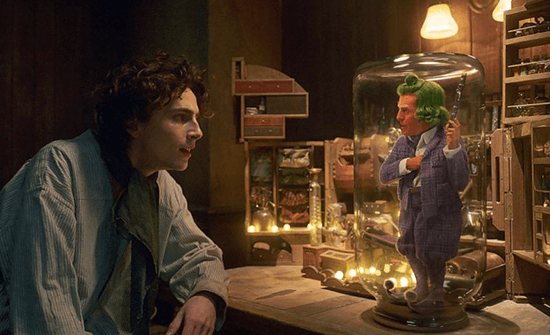 That brings me to Hugh Grant, another actor I’m fond of, who plays the primary Oompa-Loompa, a “little orange man” named Lofty. Given how Wonka regularly references the 1971 film, in which dwarf actors played Oompa Loompas, the viewer might expect a dwarf to play Lofty. King has set the expectation with his allusions to the precedent, including the “Oompa Loompa” song and nostalgic lines such as “scratch that; reverse it.” Even the production’s look of the Oompa Loompa resembles the original, with citrus-orange skin, lime-green hair parted down the middle, and girlish curls at the end. In the role, Grant appears in an awful CGI state, reduced to a foot-long figure, his head digitally shrunken and placed on an animated body that exists on another plane altogether (2007’s Fred Claus used a similarly uncanny, if not nightmarish approach to make Ludacris a North Pole elf). Instead of hiring an actor appropriate for the role—an appropriateness established by the original, which King frequently references and therefore remains somewhat beholden to—the production probably paid Grant millions and spent millions more to create the bizarre effect. So it’s rather shameful—on par with Gary Oldman in Tiptoes (2002)—and unnecessarily excessive that the production didn’t hire a dwarf actor for the role, or at least make Grant’s version look better, or visualize something altogether new.
That brings me to Hugh Grant, another actor I’m fond of, who plays the primary Oompa-Loompa, a “little orange man” named Lofty. Given how Wonka regularly references the 1971 film, in which dwarf actors played Oompa Loompas, the viewer might expect a dwarf to play Lofty. King has set the expectation with his allusions to the precedent, including the “Oompa Loompa” song and nostalgic lines such as “scratch that; reverse it.” Even the production’s look of the Oompa Loompa resembles the original, with citrus-orange skin, lime-green hair parted down the middle, and girlish curls at the end. In the role, Grant appears in an awful CGI state, reduced to a foot-long figure, his head digitally shrunken and placed on an animated body that exists on another plane altogether (2007’s Fred Claus used a similarly uncanny, if not nightmarish approach to make Ludacris a North Pole elf). Instead of hiring an actor appropriate for the role—an appropriateness established by the original, which King frequently references and therefore remains somewhat beholden to—the production probably paid Grant millions and spent millions more to create the bizarre effect. So it’s rather shameful—on par with Gary Oldman in Tiptoes (2002)—and unnecessarily excessive that the production didn’t hire a dwarf actor for the role, or at least make Grant’s version look better, or visualize something altogether new.
Watching Wonka, I felt split between wincing displeasure and twinkling-eyed joy, with a miscast Chalamet and repellent CGI Grant destabilizing the otherwise delightful mood. Many will doubtlessly overlook my hangups and savor the movie; much of the audience in my screening did. After all, there’s plenty to love here—it’s a happy, high-spirited, and jolly good time with an admirable silliness throughout. King and his team may rely too heavily on digital tricks, from balloon-flying escapes to geysers of liquid chocolate, but the sets and costumes look so sharp and beautifully realized that I cannot dismiss them. If only the titular character was enigmatic in the slightest and his diminutive cohort was even mildly passable, the experience might have gone down smoother. Wonka is like one of his many-layered chocolates, except, instead of one pleasant sensation after another, the morsel reveals a touch of heavenly silkiness followed by a flavorless lead performance, then a harmony of salty and sweet that gives way to the bitter aftertaste of the Oompa Loompa. I don’t regret trying it, but I prefer the original Wonka bar.
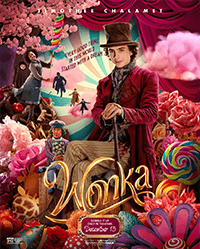
Thank You for Supporting Independent Film Criticism
If the work on DFR has added something meaningful to your love of movies, please consider supporting it.
Here are a few ways to show your support: make a one-time donation, join DFR’s Patreon for access to exclusive writing, or show your support in other ways.
Your contribution helps keep this site running independently. However you choose to support the site, please know that it’s appreciated.
Thank you for reading, and for making this work possible.
Brian Eggert | Critic, Founder
Deep Focus Review


